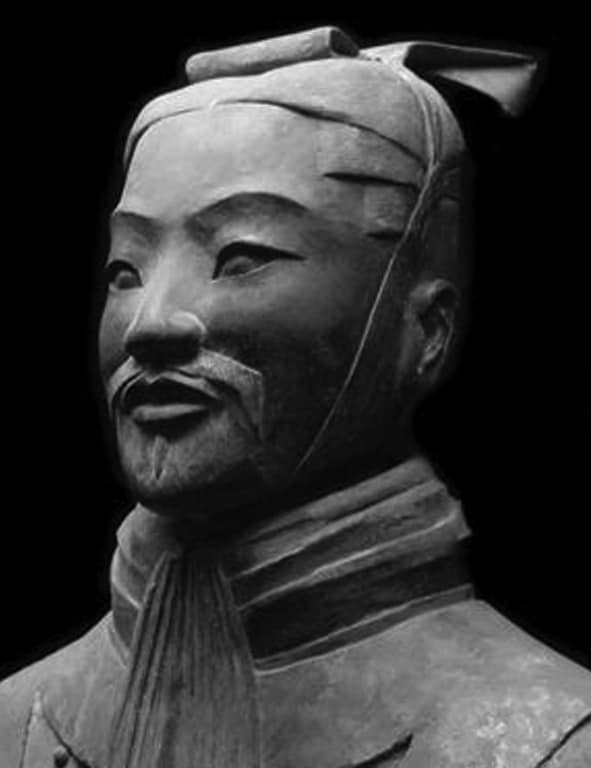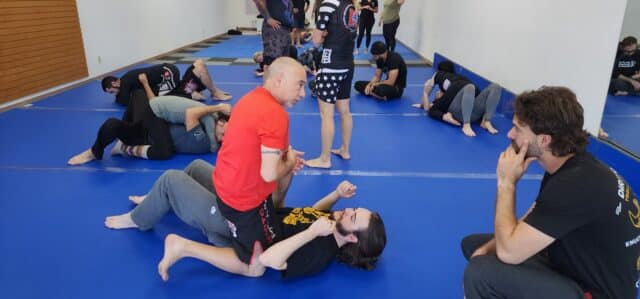
ART OF WAR (Sun Tzu) APPLIED TO BJJ
1.
-When the opponent has made a plan of attack against us, we must anticipate him by delivering our own
attack first.”
-Not an attitude of defense, whereby one might be content to foil the enemy’s stratagems one after
another, but an active policy of counter-attack.
-Supreme excellence consists in breaking the opponent’s resistance without fighting.
“He who wishes to fight must first count the cost”.
-Attack him where he is unprepared, appear where you are not expected.
– “While we are taking our ease, wait for the adversary to tire himself out. “Lure him on and tire him out.”
-The good tactician plays with his adversary as a cat plays with a mouse, first feigning weakness and
immobility, and then suddenly pouncing upon him. If he is taking his ease, give him no rest.
-If your opponent is of choleric temper (easily angered), seek to irritate him. Pretend to be weak, that he
may grow arrogant.
-If he is secure at all points, be prepared for him. If he is in superior strength, evade him.
-Hence, when able to attack, we must seem unable; when using our forces, we must seem inactive; when
we are near, we must make the enemy believe we are far away; when far away, we must make him
believe we are near. Hold out baits to entice the enemy. Feign disorder and crush him.
– “Attack is the secret of defense; defense is the planning of an attack.” It would be hard to find a better
epitome of the root-principle of war.
– “Knowing the enemy enables you to take the offensive, knowing yourself enables you to stand on the
defensive.”
-If you know neither the enemy nor yourself, you will succumb in every battle.
-If you know the enemy and know yourself, you need not fear the result of a hundred battles. If you know
yourself but not the enemy, for every victory gained you will also suffer a defeat.
-He will win who, prepared himself, waits to take the adversary unprepared.
-The secret lies in an eye for opportunity, and in not letting the right moment slip.
-If he can fight, he advances and takes the offensive; if he cannot fight, he retreats and remains on the
defensive. He will invariably conquer who knows whether it is right to take the offensive or the defensive.
-He will win who knows when to fight and when not to fight.
– “The skillful employer of men will employ the wise man, the brave man, the covetous man, and the
stupid man. For the wise man delights in establishing his merit, the brave man likes to show his courage
in action, the covetous man is quick at seizing advantages, and the stupid man has no fear of death.”
2.
-He who can modify his tactics in relation to his opponent and thereby succeed in winning, may be called
a heaven-born captain.
-Therefore, just as water retains no constant shape, so in warfare there are no constant conditions.
-So, in war, the way is to avoid what is strong and to strike at what is weak. [Like water, taking the line of
least resistance.]
-Do not repeat the tactics which have gained you one victory, but let your methods be regulated by the
infinite variety of circumstances.
– “Show no sign “of what you mean to do, of the plans that are formed in your brain.
-Force him to reveal himself, so as to find out his vulnerable spots.
-By noting the joy or anger shown by the enemy on being thus disturbed, we shall be able to conclude
whether his policy is to lie low or the reverse.
– “Know beforehand all plans conducive to our success and to the enemy’s failure.” Rouse him and learn
the principle of his activity or inactivity.
-For should the enemy strengthen his van, he will weaken his rear; should he strengthen his rear, he will
weaken his van; should he strengthen his left, he will weaken his right; should he strengthen his right, he
will weaken his left. If he sends reinforcements everywhere, he will everywhere be weak.
-The spot where we intend to fight must not be made known; for then the enemy will have to prepare
against a possible attack at several different points.
3.
-Hasty temper, which can be provoked is one’s doom.
– “He who lets an advantage slip will subsequently bring upon himself real disaster.”
-Nothing is to be achieved in war unless you are willing to take risks.
– “Cowardice” as being of the man “whom timidity prevents from advancing to seize an advantage,”
cowardice, which leads to capture.
-Recklessness, leads to destruction.
-The merely brave man is prone to fight recklessly; and he who fights recklessly, without any perception
of what is expedient, must be condemned.”
– “Get the enemy into a position where he must suffer injury, and he will submit of his own accord.”
– “If I wish to extricate myself from a dangerous position, I must consider not only the enemy’s ability to
injure me, but also my own ability to gain an advantage over the enemy.
– “If we wish to wrest an advantage from the enemy, we must not fix our minds on that alone, but allow for
the possibility of the enemy also doing some harm to us and let this enter as a factor into our
calculations.”
4.
-Exhibit the coyness of a maiden, until the enemy gives you an opening; afterwards emulate the rapidity
of a running hare, and it will be too late for the enemy to oppose you.
– “If the enemy shows an inclination to advance, lure him on to do so; if he is anxious to retreat, delay on
purpose that he may carry out his intention.” The object is to make him remiss and contemptuous before
we deliver our attack.
-The expediency of aggressive or defensive tactics; and the fundamental laws of human nature: these are
things that must most certainly be studied.
– “The axiom, that war is based on deception, does not apply only to deception of the enemy. One must
realize we can be deceived as well.
-By altering his arrangements and changing his plans, [not using the same stratagem twice.] he keeps the
enemy without definite knowledge.
– “To mystify, mislead, and surprise the enemy,” is one of the first principles in war.
-The advantage of position neutralizes the inferiority in stamina and courage.
– “The way to eliminate the differences of strong and weak and to make both serviceable is to utilize
accidental features of the fight”.
-Further you control, the greater will be the confidence.
-Take advantage of the enemy’s unreadiness, make your way by unexpected routes, and attack
unguarded spots.
5.
-Anger may in time change to gladness; vexation may be succeeded by content.
-If it is to your advantage, make a forward move; if not, stay where you are.
-What they must not do, and what will prove fatal, is to sit still and simply hold to the advantages they
have got.”
– “Those who want to make sure of succeeding in their battles and assaults must seize the favorable
moments when they come and not shrink on occasion from heroic measures.
– “In war, there are various indirect methods of attack.
– “If you see a possible way, advance; but if you find the difficulties too great, retire.”

Written by Joe Lutrario
Edited by Jason Mcdonald
